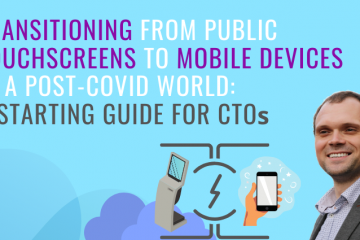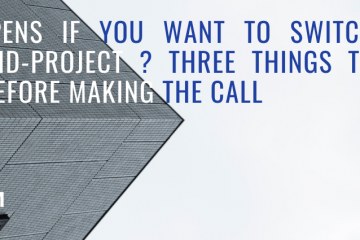In today’s ever-expanding digital and mobile world, adding a custom mobile app to grow or enhance your business has become a no-brainer. In the United States alone, more than 80 percent of the population now owns a smartphone, according to the Pew Research Center. A custom mobile app can be a brilliant way to expand your market and meet your customer’s needs in a wide variety of industries.
Once you make the decision to pursue a new mobile app, though, where do you begin? There are obviously multiple approaches. You may choose to develop your company’s app completely in-house, of course — but there are also a lot of reasons why it may make more sense to enlist a third-party vendor to assist with the development.
For example, if you don’t have the engineering resources available, partnering with an outside development firm can provide a simpler solution than going through the tedious (and costly) process of hiring new engineers yourself and managing the project entirely in-house. This is especially the case when the app you want to develop requires a certain level of serious expertise, such as for apps that are security-sensitive or that interact with innovative emerging tech or hardware, such as blockchain or AI. A third-party mobile app development company can also be a smart choice to reduce risks associated with experimental or side projects.
Of course, there are risks associated with hiring third-party vendors for mobile app development projects, too. Choosing your development company requires some due diligence and research. In particular, there are a few red flags to be aware of and to avoid whenever possible. Here are some of the biggest key warning signs that a potential vendor may not be the best for your project:
1. They accept the task without asking a lot of questions.
The first thing you need in a company that’s building a mobile app to meet your unique needs is to make sure that they actually understand your unique needs. This understanding doesn’t happen automatically. No one is a mind reader. The only way a vendor can truly assess and analyze your app’s requirements is through a comprehensive initial conversation. Your potential vendor should be asking you a ton of questions before even sending you an estimate, let alone before signing on to undertake the work itself.
Why it’s a red flag: If your potential mobile app development company isn’t taking the initiative to ask you a lot of questions about the project up front, it’s likely a sign that (1) they are very inexperienced and/or (2) they lack a solid set of communication and project management skills. Both of these issues could definitely spell trouble. If they choose to begin work without gathering as comprehensive a picture as possible of your requirements, chances are good the final product they deliver won’t meet your needs and will instead be based on a lot of faulty assumptions.
An effective and successful relationship with a third-party development company depends on a solid foundation of proactive communication. Proactive means it should be their responsibility to ask for the info they need to meet your needs. If their communication isn’t top-notch from day one, especially when they’re still trying to earn your business, what’s it going to be like on day 100?
2. They lack experience and expertise in mobile security.
No matter what kind of mobile app you’re developing — whether it’s for retail, health, banking, gaming, or any other industry — security should always be a critical consideration. As hackers become increasingly sophisticated, mobile phones become increasingly vulnerable to attack. In other words, the security of your customers’ data, as well as your company’s, could be at risk whenever a mobile app comes into the picture.
Why it’s a red flag: Any mobile app development firm that doesn’t communicate the importance of security and build security into their approach from day 1 probably doesn’t have the expertise to adequately protect your product and data. Any potential vendor you choose should be able to demonstrate solid experience and expertise in security.
3. They give you an estimate right away — and it’s lower than you expected.
It hardly seems like something to complain about when an estimate comes in to build your app and it’s much less than what you had budgeted for. Who doesn’t love a good deal, right? Especially because cost savings are likely one of the reasons you decided to seek outside help for your mobile app development in the first place. However, evaluating an estimate from a third-party vendor should be done carefully, especially when it comes in significantly under budget. Sometimes, as they say, if it seems too good to be true, it probably is.
Why it’s a red flag: A very low estimate could mean a lot of things. It could come from the vendor’s inexperience (because they don’t understand what would truly be involved in building the app to your specifications). Or, especially if the estimate comes in quickly before any detailed conversations (see Warning Sign #1 above), it could mean they just haven’t worked hard enough to understand the app you need and are therefore underestimating the time and complexity involved. Finally, a low estimate could mean that the vendor won’t prioritize quality in their work. While a bargain can be a great thing, chances are good you’ll end up losing money in the long run when the final product doesn’t meet your needs or meet your business’s top-quality standards, leading you to have to start the whole process over again. When it comes to cutting-edge tech, quality work is always the right investment.
4. They don’t use or offer an agile approach.
The consensus far and wide is that 9 times out of 10, an agile development approach is going to be the best for a custom mobile app development project. Agile development projects are more successful because they can deliver results sooner while also providing the flexibility to adapt to evolving requirements, unexpected issues and the clients’ needs. Reaping the many developments of an agile approach requires a solid understanding of how to manage these projects, however, because they often have more moving parts than an “old-school” development project.
Why it’s a red flag: A third-party mobile app development company that doesn’t offer or at least discuss the possibility of an agile approach is probably not operating at the forefront of mobile tech. Maybe they’re a few years behind. It may also mean that the company lacks either project management expertise or skilled developers or engineers who can deliver results in a flexible, fast-moving environment and easily adapt to change. Those are some of the qualities that will be essential to delivering an innovative and powerful app.
5. They don’t have a history of referrals or can’t provide strong case studies about their prior work.
When choosing a third-party vendor to develop your mobile app, be sure to take a look at the company’s history. Do they have a solid portfolio of apps that showcase a variety of skills and expertise? And, perhaps equally importantly, can they demonstrate that other companies often recommend them to others for those skills and projects? Even if you haven’t been personally referred to a company you’re considering, you can still learn a lot by finding out whether any of their business comes from referrals. A healthy development firm should have a healthy history of satisfied customers who are happy to recommend them to others.
Why it’s a red flag: Any company can claim on their website or in a marketing email that they are experts in mobile app development. But it’s another thing entirely to prove it with evidence of prior work. Similarly, if they aren’t gaining any new business from referrals, that could either be a sign of inexperience or a sign that their previous customers or connections haven’t been impressed with their management, their communication or their work.
6. They seem “good enough.”
Whether you’re envisioning an app as an experimental or supplemental project to bolster your current business, or looking to develop an app that will play a central role in your company, you need a vendor that inspires confidence. Creating world-class mobile apps is a complex and sometimes costly effort, after all. The vendor you choose should blow you away — if not immediately, then after you talk with them in depth about your project and learn more about their ideas, their approach and their background.
Why it’s a red flag: If you consider all the above criteria and more, and yet a company you’re evaluating still just comes across as “fine” or “ok” or “good enough but not great,” that’s a sign you should keep looking. Any early hints of incompatibility — even some that don’t seem like a big deal at first — could end up snowballing later on. To avoid the risk of disappointment or unsatisfactory results, it’s better to move on and find a better fit now than regret your decision down the road.
In the end, there is no simple formula that determines which company will be the best choice to develop your mobile app. There will always be many different factors involved due to the nature of your specific project, your company, your market and your needs. There will also always be some risks involved with seeking outside assistance to develop an app. However, avoiding common red flags can take you a long way in avoiding some of those risks and help position your app for success.
You know what to do. Trust the evidence, trust the data, and trust your instincts!
——————————
Can Genium help your company create a cutting-edge custom mobile app?
At Genium, we specialize in groundbreaking custom software development projects in emerging and complex tech, including developing industry-leading mobile apps. We have a solid 10+ year record of innovative and agile client work, and our teams of expert developers, engineers and security experts are perfectly positioned to accelerate your time to market while meeting the highest quality standards. Don’t hesitate to contact us today to find out how we can make your innovative vision a reality.


